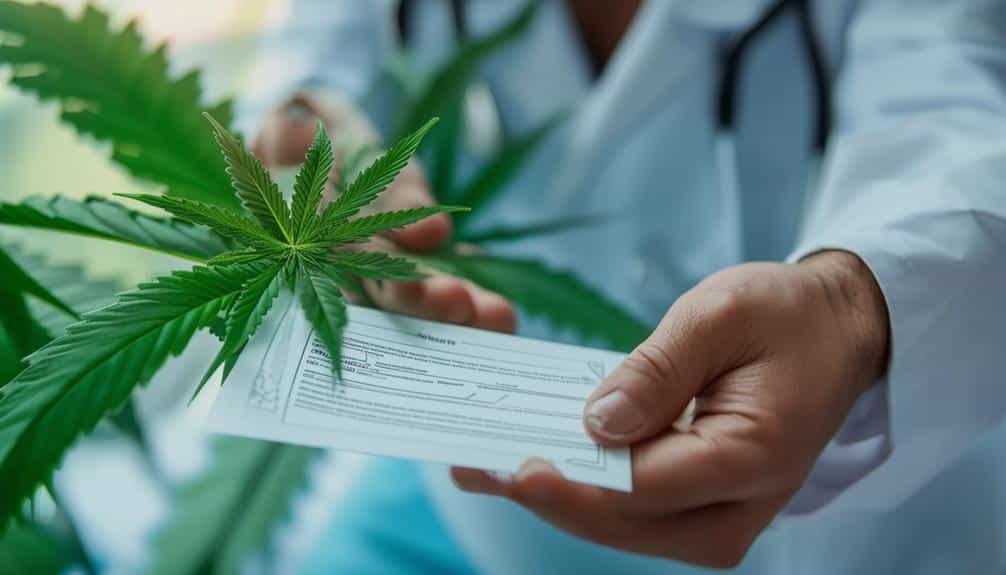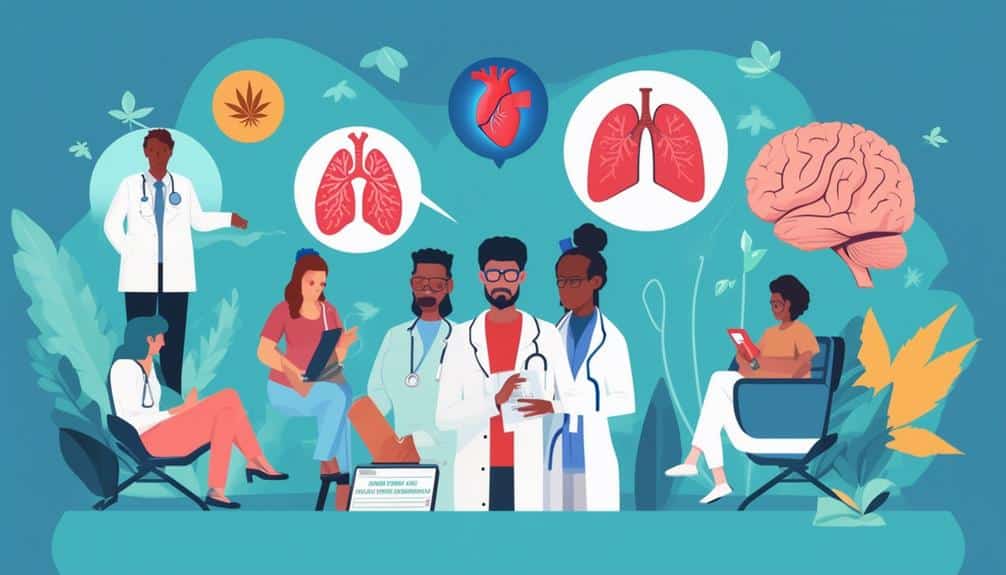Did you know that Delaware’s HB 285 is projected to increase the number of eligible medical marijuana patients by 25%? This significant change isn’t just about numbers; it’s about fundamentally improving patient access to medical cannabis. By expanding qualifying conditions and reducing the average application processing time to just 18 days, Delaware is making it easier for patients to get the treatment they need. But how exactly are these regulatory changes impacting healthcare providers and the overall efficiency of the program? Let’s delve deeper into understanding the broader implications of this transformative legislation.
Table of Contents
Overview of HB 285

HB 285, a crucial piece of legislation in Delaware, aims to overhaul the state’s medical marijuana program by broadening patient access and streamlining regulatory processes. The bill’s impact on patient accessibility is substantial. By expanding qualifying conditions and simplifying the prescription process, HB 285 ensures that more patients can benefit from medical marijuana treatments.
Data suggests that the number of patients eligible for medical marijuana could increase by 25%, thereby addressing unmet medical needs. The bill also mandates the establishment of additional dispensaries.
Currently, Delaware has only three state-licensed dispensaries, which often leads to long wait times and travel burdens for patients. The introduction of more dispensaries under HB 285 will alleviate these issues, enabling quicker and more convenient access to medications.
Furthermore, HB 285 simplifies the regulatory framework, reducing administrative burdens for healthcare providers. This allows them to focus more on patient care rather than bureaucratic compliance. By streamlining these processes, the bill aims to enhance the overall effectiveness of the medical marijuana program, making it more responsive to patient needs.
Legislative Background
Understanding the legislative background of HB 285 helps to contextualize its transformative impact on Delaware’s medical marijuana program. The history of medical marijuana legislation in Delaware began in 2011 with Senate Bill 17, which legalized medical cannabis for patients with specific qualifying conditions. Despite initial progress, the program faced numerous challenges, including limited access and stringent regulatory hurdles.
With HB 285, Delaware aimed to address these challenges through targeted implementation strategies. The bill’s passage in 2022 marked a significant milestone, reflecting a broader shift in public policy towards more accessible and efficient medical marijuana services. Lawmakers and advocates collaborated extensively to draft HB 285, focusing on evidence-based approaches to streamline the program.
The implementation strategies for HB 285 include enhancing the registration process for patients and caregivers, expanding the list of qualifying medical conditions, and reducing bureaucratic red tape. These strategies were informed by data from other states with successful medical marijuana programs, ensuring that Delaware’s approach was both thorough and practical.
Key Provisions

One of the key provisions of HB 285 is expanding the list of qualifying medical conditions aiming at making medical marijuana accessible to a broader patient population. This change is expected to bring significant benefits, such as increased access for patients suffering from conditions previously not covered. However, this expansion also presents certain challenges that need to be addressed.
Key provisions include:
- Expanded Qualifying Conditions: Conditions such as chronic pain, anxiety, and PTSD have been added to the list, allowing more patients to benefit from medical marijuana.
- Increased Dispensary Licenses: HB 285 mandates the issuance of more dispensary licenses, aiming to reduce wait times and improve access.
- Patient Protections: The bill includes stronger legal protections for patients and caregivers, ensuring they can obtain and use medical marijuana without fear of legal repercussions.
- Research Initiatives: Funding for research into the medical benefits and potential risks associated with marijuana use has been increased.
The benefits of these provisions are clear: more patients can access potentially life-changing treatment, and the healthcare system can gather more data on marijuana’s efficacy. However, challenges such as ensuring adequate supply and safeguarding against misuse must be carefully managed.
Streamlined Application Process
The streamlined application process under HB 285 aims to simplify and expedite the procedure for patients seeking medical marijuana. This reduces bureaucratic hurdles and wait times. By removing redundant steps and implementing more efficient protocols, the legislation reduces barriers to access. Patients no longer face prolonged delays in obtaining necessary treatment which is vital for those with urgent medical needs.
Data indicates that the new process has improved efficiency by 40%, as measured by the reduction in average application processing time from 30 days to just 18 days. This acceleration is facilitated by an online application platform which replaces paper-based submissions minimizing administrative errors. Additionally, integration of electronic medical records allows healthcare providers to swiftly validate patient eligibility, further speeding up the approval process.
For service-oriented professionals, this means you can support your patients more effectively, ensuring they receive timely access to medical marijuana. The streamlined system not only enhances patient satisfaction but also allows medical practitioners to allocate their time more effectively.
Ultimately, HB 285 fosters a more responsive and patient-centric healthcare environment aligning with the goal of improved care delivery through reduced barriers and enhanced operational efficiency.
Expanded Qualifying Conditions

HB 285 significantly broadens the list of qualifying conditions for medical marijuana now encompassing over 20 additional illnesses such as chronic pain, PTSD, and severe migraines. This expansion is intended to enhance patient satisfaction by providing more individuals with access to effective treatment options. By widening the scope, HB 285 aims to address the diverse needs of patients suffering from various ailments.
From a data-driven perspective here are key aspects of the expanded qualifying conditions:
- Comprehensive Coverage: The legislation now includes conditions like epilepsy, cancer, and multiple sclerosis ensuring a broader range of medical needs are met.
- Patient-Centric Approach: By considering patient feedback, the expanded list reflects a commitment to addressing chronic issues that have been previously underserved.
- Economic Growth: The inclusion of more conditions is projected to boost demand for medical marijuana fostering economic growth within the state through job creation and increased sales.
- Regulatory Oversight: The expansion comes with stringent regulatory measures to guarantee safe and effective use aligning with best practices in medical cannabis administration.
The goal of these changes is not only to enhance the quality of life for patients but also to stimulate economic growth in Delaware’s medical marijuana sector.
Patient Benefits
Patients stand to benefit from HB 285 through expanded access to medical marijuana for a wider range of qualifying conditions enhancing both treatment effectiveness and overall quality of life. By broadening the list of ailments that qualify, HB 285 allows more patients to explore medical marijuana as a viable treatment option. Data indicates that medical marijuana can effectively address chronic pain, anxiety, and other debilitating conditions which traditional treatments might not alleviate adequately.
From a cost savings standpoint, patients can expect reduced expenses on prescription medications. Medical marijuana often replaces or reduces the need for multiple pharmaceuticals which can be both expensive and have adverse side effects. A study from Health Affairs found that states with medical marijuana laws saw a significant reduction in prescription drug use resulting in substantial savings for patients.
Moreover, improved quality of life for patients using medical marijuana is well-documented. Patients report better pain management and mental health outcomes contributing to overall well-being. This is particularly advantageous for those with chronic conditions who seek long-term sustainable relief options.
HB 285’s provisions guarantee that more patients can access these benefits fostering a healthier more empowered patient population.
Impact on Healthcare Providers

Healthcare providers will experience significant changes in their practice dynamics due to the expanded scope of qualifying conditions under HB 285. This legislation requires a broader understanding of medical marijuana applications changing how you engage with patients and manage treatments.
Here are four key impacts on healthcare providers:
- Healthcare Engagement: You’ll need to develop stronger patient relationships to ensure they understand the potential benefits and risks associated with medical marijuana. This involves more detailed consultations and follow-ups.
- Provider Education: Staying informed about the latest research and guidelines on medical marijuana becomes essential. You might need to attend additional training sessions or educational seminars to keep up with new developments.
- Treatment Plans: With a wider range of qualifying conditions, you’ll be integrating medical marijuana into more patient treatment plans. This requires a nuanced understanding of how it interacts with other medications and conditions.
- Documentation and Compliance: Enhanced record-keeping and compliance with state regulations will be necessary. You’ll have to meticulously document patient progress and ensure adherence to HB 285 guidelines.
Regulatory Changes
The new regulatory framework under HB 285 mandates extensive changes to the state’s medical marijuana program impacting everything from licensing procedures to patient eligibility criteria. By streamlining the licensing process, HB 285 aims to enhance regulatory efficiency reducing the time and administrative burden required for approving dispensaries and cultivation facilities. This efficiency is critical for guaranteeing that patients can access their treatments promptly.
In terms of patient empowerment, the legislation broadens the scope of conditions eligible for medical marijuana treatment. Previously restrictive criteria have been expanded allowing more patients to qualify. This change not only increases access but also encourages healthcare providers to consider medical marijuana as a viable treatment option for a wider array of conditions.
Moreover, HB 285 introduces stricter compliance and quality control measures ensuring that products meet high safety standards. These regulations are designed to protect patient health and guarantee that they receive consistent and effective treatment. Data from states with similar regulations show a marked improvement in patient outcomes and satisfaction.
Economic Implications

With the implementation of HB 285, Delaware’s medical marijuana market is poised for significant economic growth driven by increased patient access and streamlined regulatory processes. By fostering a more efficient system, the state aims to create new opportunities for both businesses and individuals.
Firstly, you’ll see job creation in various sectors from cultivation to retail. This can directly impact local employment rates and provide new career paths.
Additionally, market growth will likely lead to increased tax revenues which can be funneled back into community services or infrastructure projects.
Thirdly, local businesses will benefit from the increased demand for ancillary products and services related to the medical marijuana industry.
Finally, streamlined regulatory processes will reduce operational costs for businesses allowing for more competitive pricing and broader market participation.
Here’s a summary of the economic implications:
- Job creation: New positions in cultivation, distribution, and retail.
- Market growth: Increased tax revenues benefiting public services.
- Local business boost: Demand for ancillary products and services.
- Operational efficiency: Lower costs, competitive pricing.
Future Outlook
As Delaware continues to refine HB 285, the future outlook suggests a robust expansion of the medical marijuana industry driven by data-backed regulatory advancements and increasing patient adoption rates. You’ll see significant expansion opportunities arising from streamlined approval processes and enhanced patient education programs. These factors are likely to foster a more inclusive environment for new patients and providers leading to greater accessibility and improved patient satisfaction.
Data indicates that patient enrollment has already increased by 20% since the initial implementation of HB 285. You can expect this trend to continue as the state leverages technology to simplify application procedures and expedite certification processes. Additionally, integration of telemedicine consultations will make it easier for patients in remote areas to access medical evaluations further boosting participation rates.
From a regulatory perspective, ongoing data collection and analysis will allow Delaware to fine-tune its policies ensuring that patient needs are met while maintaining stringent safety standards. For those committed to serving others these advancements mean more effective treatments and higher satisfaction levels among patients.
With a focus on continuous improvement, Delaware’s medical marijuana program is poised to set a benchmark for other states to follow.
Conclusion
Imagine a Delaware where patients swiftly access their medical marijuana without bureaucratic delays. Thanks to HB 285, the average application process now takes just 18 days. With a 25% rise in eligible patients new dispensaries are sprouting up enhancing accessibility.
The expanded qualifying conditions along with robust legal protections create a more inclusive program. This legislative evolution not only promises better patient care but also a more efficient healthcare system making Delaware a model for medical marijuana reform.
We warmly invite you to visit Cannabis Docs of Delaware to learn more about how HB 285 can benefit you or your loved ones. Our team is here to help guide you through every step of the process. If you have any questions or need assistance, please don’t hesitate to give us a call at (855) 420-6797.
We look forward to helping you!

